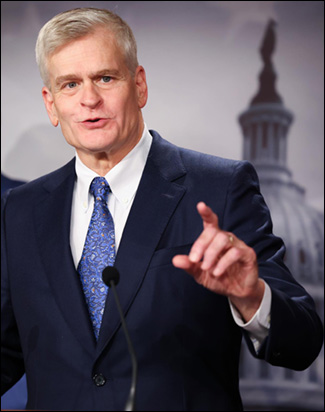By Jim Ellis — Thursday, June 19, 2025
Senate
In an attempt to deny Sen. Bill Cassidy (R-LA) renomination, Louisiana state Sen. Blake Miguez (R-New Iberia) announced early this week that he will enter the 2026 Republican Senate primary. Already in the race is State Treasurer John Fleming, along with four minor GOP candidates.Cassidy is one of the seven Republican Senators (just three remain in office) who voted to impeach President Trump in post-election 2020; therefore, Cassidy earning an endorsement from Trump seems unlikely. Trump’s public support in Republican primaries has, for the most part, been extremely helpful to the anointed candidate.
Hence, Sen. Cassidy faces some obstacles toward his 2026 re-election bid. In addition to his problems with the President and facing credible opponents, he also must navigate an entirely new election system.
In 2024, Gov. Jeff Landry (R) and the state legislature changed Louisiana election law. For federal races, the jungle primary system is eschewed, and a partisan structure reimposed. The new primary schedule means that Sen. Cassidy, and all other federal incumbents, must stand for renomination on April 18, 2026, with a runoff election scheduled for May 30 if no candidate secures majority support on the first vote.
In Louisiana’s previous system, and one that still holds for most state races, all candidates are placed on the same ballot for an election scheduled in November. If a leading candidate fails to receive majority support, the top two finishers advance into a December runoff.
The argument for adopting the new law for federal elections was accentuated with change proponents saying that the Louisiana freshmen US House members forced into December runoffs were put in an adverse position that hurt the state. They pointed out their new members were getting lesser committee assignments and behind in other internal House matters because the entire body was elected a full month earlier.
According to Louisiana’s Advocate news site, Sen. Cassidy was actively opposing the new election law even after adoption. He was lobbying the legislature this year to eliminate the law’s runoff provision in order to allow plurality victories. The current session ended without the legislature making such a change.
Incumbents forced into runoff elections generally fare poorly because a majority of primary voters have already chosen a different candidate. Such is likely the principal reason Sen. Cassidy was attempting to convince the legislature to change the new law.
John Fleming, a physician, was elected State Treasurer in 2023. He previously served four terms in the US House, succeeding former House Ways and Means Committee chairman Jim McCrery in the 4th Congressional District and immediately preceding now-Speaker Mike Johnson. Rep. Fleming ran for US Senate in 2016, losing the Republican nomination to now-Sen. John Kennedy (R).
Upon leaving the House, Dr. Fleming was appointed by President Trump as Assistant Secretary of Commerce for Economic Development, and later Deputy White House Chief of Staff. In the House, Dr. Fleming was an original co-founder of the House Freedom Council.
In the initial Federal Election Commission campaign finance disclosure report for the 1st Quarter of 2025, Dr. Fleming self-funded his campaign with a $2.03 million cash influx but raised only $269,479 from other sources. It remains to be seen how well he does in the 2nd Quarter, which will end on June 30.
Blake Miguez was first elected to the state House of Representatives in a 2015 special election. He secured full terms later in 2015 and 2019 before winning a state Senate seat in 2023. During his tenure in the House, Miguez was elected Majority Leader in 2020. Professionally, he is an oil and gas company executive and has won national handgun shooting contests.
We can expect a primary campaign to be dominated with attacks against Cassidy arguing that he is a “RINO” (Republican In Name Only) because he voted to impeach Trump and for his votes, stances, and public statements on certain other issues.
With at least two major candidates making similar arguments against the Senator, the possibility grows that he will be forced into a runoff. If so, Cassidy’s chances of winning renomination would become diminished.
The Louisiana Senate primary will be a race to watch early next year because Sen. Cassidy’s renomination appears far from certain. We have yet to see any major action on the Democratic side, but it is certain the party will file a credible nominee.







